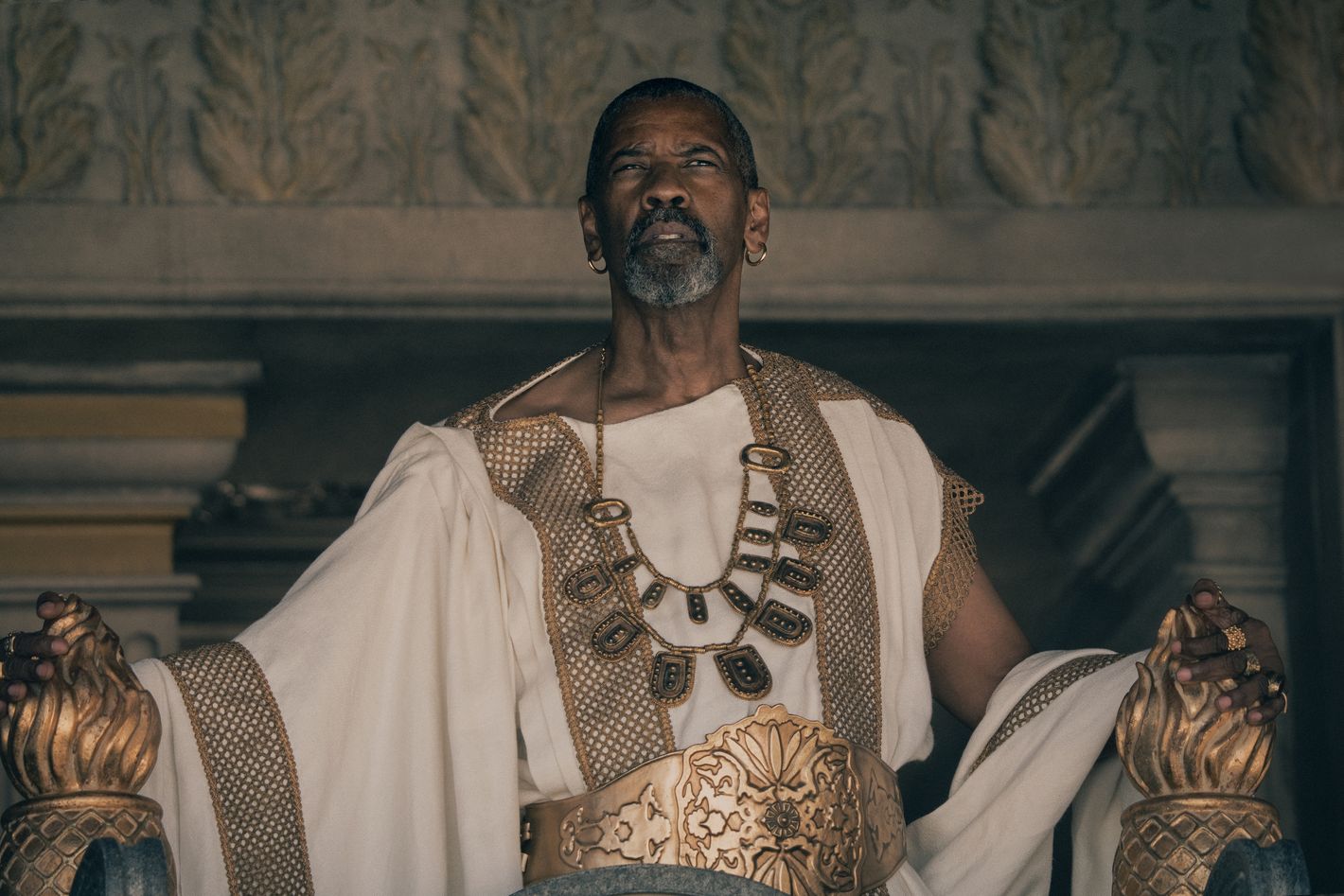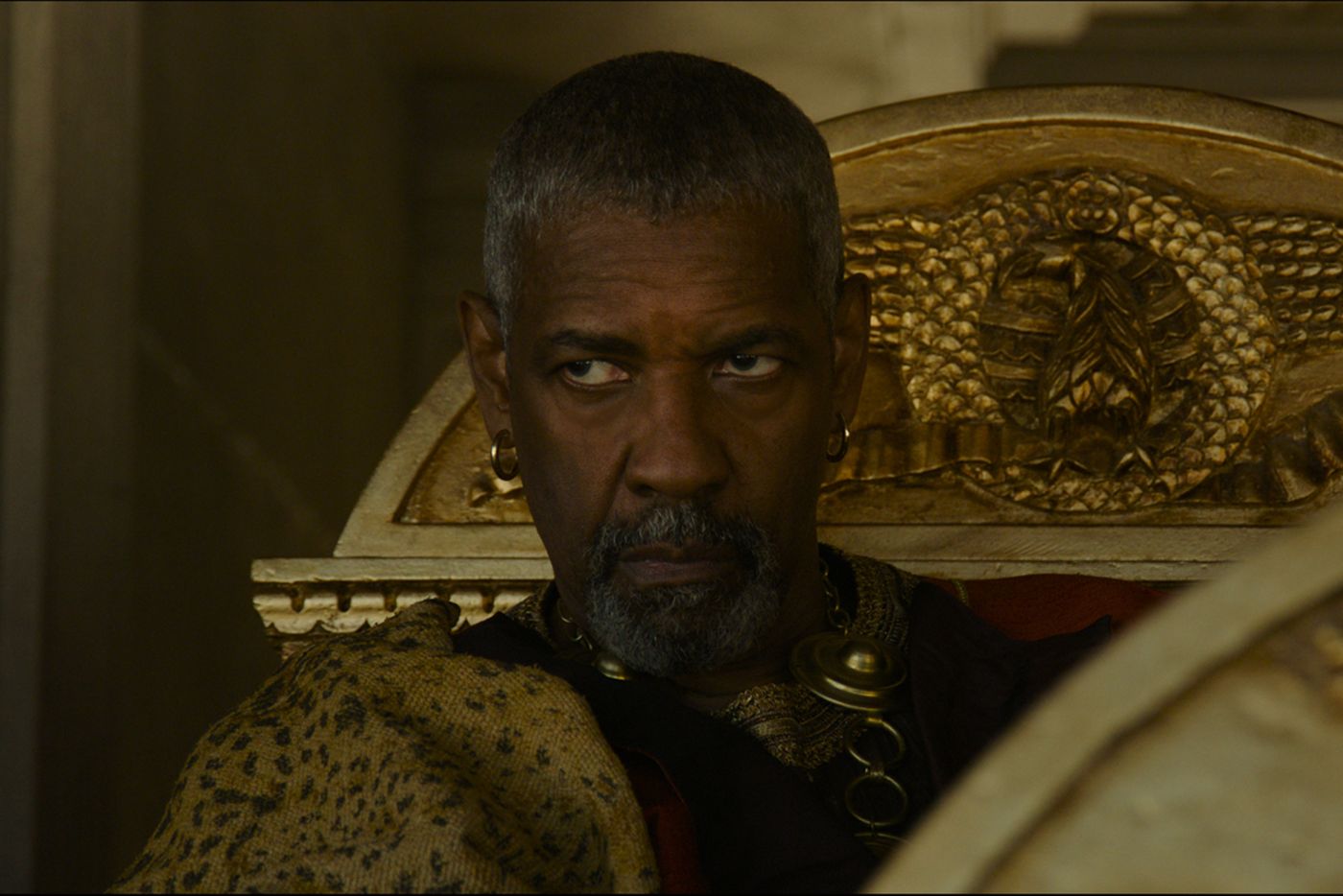
Spoilers follow for Gladiator II, released in theaters on November 22.
There are spectacles of all sorts in Gladiator II, Ridley Scott’s sequel to his 2000 Best Picture winner. Sharks and baboons with a taste for human flesh chomping through fighters. Paul Mescal sans shirt, with a chest as beefy as it is hairless. Joseph Quinn and Fred Hechinger, under white powder and red eye shadow like Joker sycophants. A lot of this film attempts to be unforgettable. But only one element of it feels worthy of a Colosseum-issued thumbs-up and gives Gladiator II the pomposity and archness it needs: Denzel Washington and his many lavish, embroidered, and embellished outfits.
In Gladiator II, Washington unleashes the force of his A-list stardom, his undeniable “one of America’s greatest actors ever” quality, as Macrinus, a former slave and gladiator who, in the 20 years since we last visited Rome, has made himself indispensable to its elites. He bends to the whims of the city and its rulers, supplying weapons to Emperors Geta (Joseph Quinn) and Caracalla (Fred Hechinger) for their ever-expanding wars and buying prisoners of those battles to join his ranks of enslaved gladiators, including lost Prince of Rome Lucius (Mescal). At first, Macrinus seems just like a Machiavellian opportunist, someone who understands that, as a Black man in Rome, his own wealth and prestige is determined only by what he can provide others. But Washington never plays someone who is “just” anything. Macrinus is the film’s best–written character, with ambitions and resentments against Rome that are far more compelling than Lucius’s vague defense of it. Macrinus wants to dominate, and through the force of his personality and the flourishes of his caftans, he does.
Washington delivers the film’s most finely tuned performance, one full of dignity and bitterness, arrogance and resolve. The man just outacts everyone he shares a scene with. There’s self-satisfaction in his voice when he asks Lucius, “What is your native language? I speak them all,” and an almost flirtatious purr as he sizes Lucius up for purchase, noting his “strong jaw, good arms.” Mescal never quite musters the fury the film tries to convince us he’s capable of, but Washington delivers the line “rage pours out of you like milk from a whore’s tit” like a lesson in making nonsense sound grand. He puts a staccato emphasis on each syllable of “de-nar-ii” and tosses off the words “pack quickly” when seizing a senator’s home after he’s just kissed each of the man’s hands and cheeks to soothe his despair — a hilariously incongruous reveal of his true irritation. Soon, Macrinus has ascended to the side of Emperor Caracalla and sweeps into a room full of senators shocked that the young man has named his pet capuchin to a military post. With little more than a cleared throat and a lightly coughed “Hail Dundus,” he persuades everyone else to praise the monkey, too. In that same scene, Macrinus brandishes the decapitated head of Emperor Geta and roars, “To restore order, I must have power,” hitting the “pow” hard like his voice is a cudgel. Soon, he declares, “The people shall acclaim me. That, my friend, is politics,” and Washington hisses the last word, as if he’s already conquered everything else and may as well reshape the English language next, just for fun.

A performance like this only comes from an actor making choices. Macrinus evokes some of Washington’s past performances (the outsize bombast of Training Day, the simmering fury of Man on Fire, the cool scheming of American Gangster) and always seems like he’s making choices, too — weighing when to speak, when to attack, when to retreat, and when to indulge. He has no interest in fitting in with the Romans, and the clearest way Washington communicates that sense of superiority is through his clothes. Whenever Macrinus fusses with one of his many opulent outfits, it’s an implicit sneer in the direction of both his peers and his enemies.
Washington approaches the role like a preening peacock or a man showing off all his toys, and at first, his constant finicking might seem like a tic. Before sitting down to judge Lucius’s potential as a gladiator, he makes sure he’s not sitting on his clothes in a way that would wrinkle them. While he stands, he smooths his sleeve cuffs or shifts his weight to billow out his caftan. When he leans forward to observe Lucius’s fighting in the arena, he runs his fingers across his cuffs and his rings. But as the film goes on, those idiosyncrasies reveal themselves to be more like a blend of subterfuge and pleasure, another way for Macrinus to hide his intentions behind a veil. He puffs out his chest and rearranges his belt before casually ruining Lucius’s memory of his grandfather Marcus Aurelius with, “The dream of Rome, that’s an old man’s fantasy.” He punctuates his disgust for the late emperor by yanking down his collar and showing Lucius’s mother the brand on his chest from when he was Aurelius’s slave, and then placidly smooths the fabric back over the scar. Macrinus tells Lucius at one point, “I have a destiny. You will be my instrument,” but his most crucial resources are his fits.
Kudos to costume designer Janty Yates and her team: Caftans and togas made of velvet and silk, and a chain mail that looks like mithril. A quilted chartreuse vest, a gold-flecked shirt, and shawls that your grandmother would compliment, worn rakishly across his shoulders or draped over his arm. Stacks of jeweled rings, chunky cuff bracelets big enough to hide a thin dagger inside, and gold hoop earrings worn always like a uniform. Washington bears all the weight of breaking up Gladiator II’s gloominess and its monotonous devotion to the martyred memory of Russell Crowe’s Maximus Decimus Meridius, and he does so with particular verve and spice whenever he’s zhuzhing his clothes or his accessories. Gladiator II often feels like an epic of yesteryear in the wrong ways (see: the latent homophobia of the evil twins lounging with male concubines; Africa as a place of rebirth for white characters). But the way Washington embraces this grandiose, over-the-top performance feels fresh and new.
Macrinus’s outfits are both egomania and armor. On the one hand, if everyone thinks he’s vain, they won’t take him seriously. On the other hand, why shouldn’t he be vain? This man elevated himself from an enslaved warrior to a gladiator who won his freedom to a respected citizen whose certainty that Rome is an evil place seems to bear out. Sure, he wants to destroy the empire, but Rome basically deserves it, and if he wants to wear a gold belt that looks like something a WWE champion would rock, why not? Or an evil-eye pendant the size of a hockey puck, or a chain of gold spheres that reaches nearly to his waist? He’s earned the right to lift his cape out of the muck and leave Rome behind. At one point, after commanding Lucius to be brought to his chambers, Macrinus changes his outfit before receiving him, implying that he made Lucius wait so he could fulfill his own sartorial whims. That is, as Macrinus himself would say, pow-er.